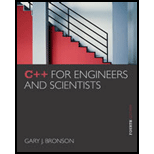
(Hydraulics) a. Design, write, compile, and run a C++

b. Manually check the values computed by your program. After verifying that your program is working correctly, modify it to determine the output velocity for a tube having an input radius of 1 in and an output radius of .75 in, when water is flowing into the tube at a rate of 1.5 ft/sec.
(a)
Program plan:
In the coding window, write the necessary code:
- ToDeclarefourdouble variablevin=1 ft/sec,rin=0.75, rout=0.5andvout.
- To calculatethe velocity of water flowing out of the tube.
- To displaythe calculatedvelocity of water flowing out of the tube.
Program description:
The main purpose of the program is to calculate thevelocity of water flowing out of the tubeby using the given velocity of water flowing inside the tube, input radius and output radius.In the main method,calculatingthe output velocity of water flowing out of the tube with the giveninput velocity of water flowing inside the pipe, input radius and output radius and finally,displayingthe output of velocity of water flowing out of the tubeto user.
Explanation of Solution
Giveninformation:
Program:
Program code to calculate the velocity of water flowing out of the tube:
//importing essential header files
#include<iostream>
#include<cmath>
//using namespace standards
usingnamespace std;
//main method
int main()
{
//declaring variable
double vin=1, rout=0.5, rin=0.75;
double vout;
//calculating d by dividing rin by rout
double d=rin/rout;
//now calculating the square of the d
double sq=pow(d,2);
//multiplying the above calculated value of sq with vin
vout=vin * sq;
//displaying output to user
cout<<"The output velocity for the water flowing out of the tube having rin="<<rin<<",rout="<<rout<<",vin="<<vin<<" is, "<<"Vout="<<vout<<"ft/sec"<<endl;
}//end of main
Explanation:
In the main method,four double variablevin=1 ft/sec,rin=0.75, rout=0.5andvout are declared. After that the velocity of water flowing out of the tubeis calculated by using the below given formula:
And the finally, calculatedresults are displayed to user.
Output:
Output of the above given program code:

(b)
Program plan:
To verify the results produced by above program and then using the above program to the program is to calculate the outputvelocity of water flowing out of the tube with the given input velocity, vin= 1.5 ft/sec, input radius, rin=1 in and output radius, rout=0.75 in.
Explanation of Solution
Giveninformation:
Program:
Explanation:
Firstly, verifying the results calculate by the above program.
Putting the given values in the above formula,
Thus, the calculated results are correct.
Now, modifying theprogramcodeto calculate the output velocity with the given input velocity, vin = 1.5 ft/sec, input radius, rin=1 in and output radius, rout=0.75 in.
Program code:
//importing essential header files
#include<iostream>
#include<cmath>
//using namespace standards
usingnamespace std;
//mian method
int main()
{
//declaring variable
double vin=1.5, rout=0.75, rin=1;
double vout;
//calculating d by dividing rin by rout
double d=rin/rout;
//now calculating the square of the d
double sq=pow(d,2);
//multiplying the above calculated value of sq with vin
vout=vin * sq;
//displaying output to user
cout<<"The output velocity for the water flowing out of the tube having rin="<<rin<<",rout="<<rout<<",vin="<<vin<<" is, "<<"Vout="<<vout<<"ft/sec"<<endl;
}//end of main
Explanation:
In the main method,four double variablevin=1.5 ft/sec,rin=1 inch, rout=0.75inch andvout are declared. After that the velocity of water flowing out of the tube is calculated by using the below given formula:
And the finally, calculatedresults are displayed to user.
Output:

Want to see more full solutions like this?
Chapter 2 Solutions
C++ for Engineers and Scientists
 C++ for Engineers and ScientistsComputer ScienceISBN:9781133187844Author:Bronson, Gary J.Publisher:Course Technology Ptr
C++ for Engineers and ScientistsComputer ScienceISBN:9781133187844Author:Bronson, Gary J.Publisher:Course Technology Ptr C++ Programming: From Problem Analysis to Program...Computer ScienceISBN:9781337102087Author:D. S. MalikPublisher:Cengage Learning
C++ Programming: From Problem Analysis to Program...Computer ScienceISBN:9781337102087Author:D. S. MalikPublisher:Cengage Learning

